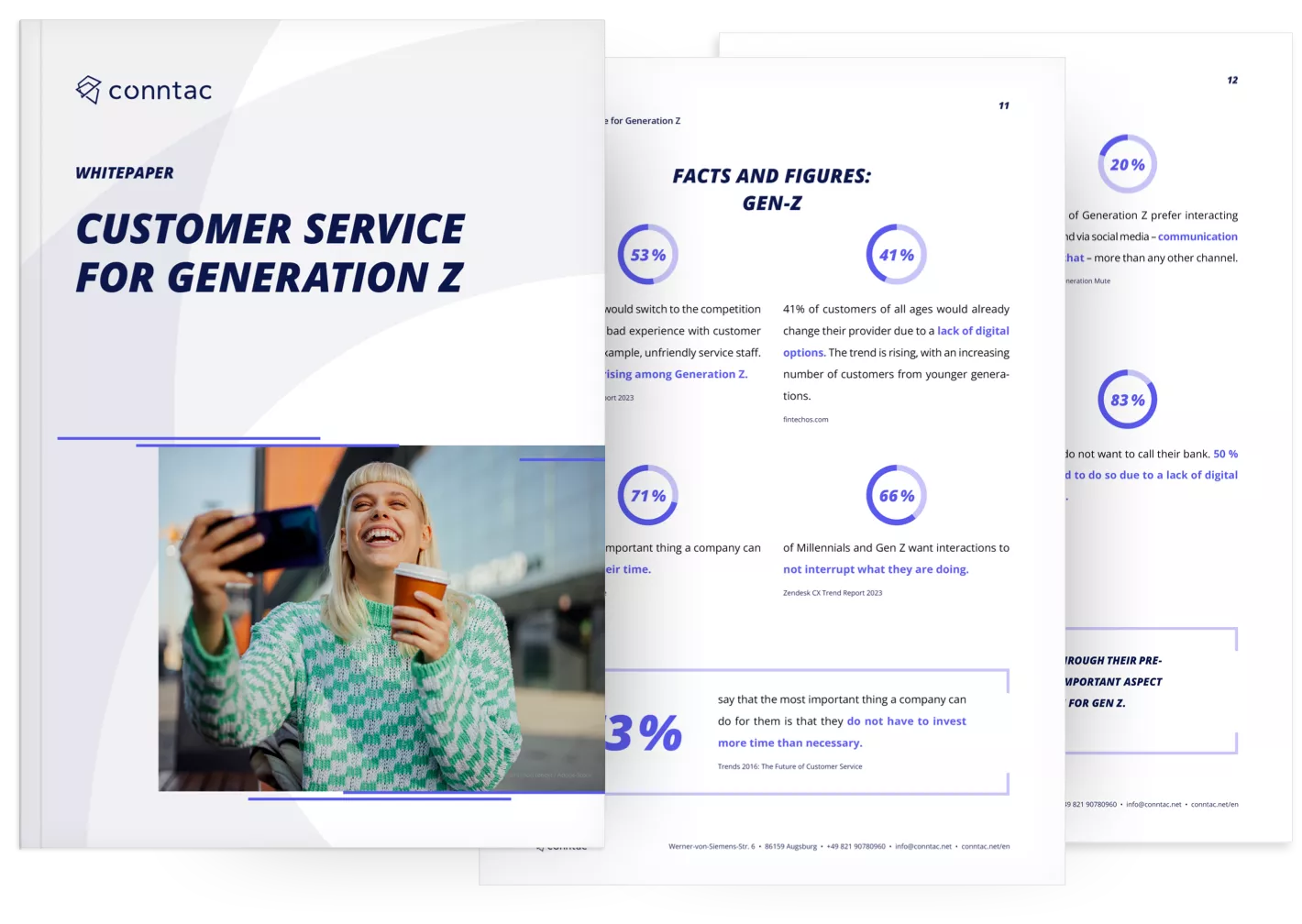The metaverse as a new reality
Imagine being able to immerse yourself in another dimension where you can navigate through virtual worlds and interact with other people with ease. This vision is becoming more and more tangible as the metaverse is inexorably coming into focus. It is no longer science fiction, but an emerging sector that offers enormous potential for companies and brands. In fact, Bloomberg Intelligence (1) predicts that the metaverse industry’s revenue will grow to an incredible $800 billion by 2024.
According to a survey of digital company executives by the BVDW (2), a third of respondents plan to invest in the metaverse in the next two years, where they will also create new opportunities to market their products and interact with customers. This puts them right on trend: according to Gartner (3), a quarter of the world’s population will spend at least an hour a day in the metaverse by 2026. Companies need to adapt their customer service to new circumstances in order to take advantage of the opportunities that the metaverse offers them, both now and in the future. The more companies interact with customers in the metaverse, the more important it becomes to help them virtually with problems. Implementation is becoming more difficult as the demands increase. According to Zendesk’s CX Trends Report (4), 60 per cent of consumers have higher expectations for customer service than they did last year.
What is the metaverse about?
The metaverse is about the fact that the way we use the internet so far is rather two-dimensional and aspherical: as consumers, we view the things that take place there via flat-screen TVs, smartphones, laptops and tablets. We have the possibility to interact with the mouse and keyboard, but ultimately we serve as observers and actors from the outside and do not enter the action ourselves.
This changes in the metaverse. Through the use of personal avatars, it is possible to immerse oneself in a parallel virtual world and date, play, shop, play sports, go to a museum, attend a concert, educate oneself, etc. with other people’s digital copies. As in real life, there are endless possibilities.
Opportunities and possibilities for companies and brands
But what exactly is the metaverse and why are we dealing with it at Conntac? Is it just a niche topic for early adopters or a crucial step in the customer experience? The answer to this question is not clear, but one thing is certain: the metaverse is becoming increasingly important and is arousing the interest of companies and consumers alike. According to a study (5) by Omnicom Media Group, 61 per cent of the German population is already showing interest in this exciting new digital reality. For many companies, the metaverse is still uncharted territory, but the signs indicate that it will play an important role in the future of customer interaction. At Conntac, we don’t just want to keep up, we want to be pioneers in this emerging field. Let’s look into the crystal ball together and take a look at the opportunities and challenges of customer support in the metaverse!
New horizons for customer service in the metaverse
In the Metaverse, reality and virtuality merge into a fascinating entity in which customer service is no longer a separate area, but rather the beating heart of the entire concept. Here, every single interaction, every adventure experienced and every rousing communication counts. Customers are looking for an immersive and authentic experience where they can connect not only with other people but also with virtual worlds. Companies and brands have realised that they need to be present in the metaverse in order to pick up customers exactly where they are in the dazzling expanses of this digital sphere. And already today, there are inspiring examples of visionary companies that use the metaverse with all its possibilities to inspire their customers and interact with them in a completely new way. The pioneers of metaverse commerce are Walmart, Nike, Ralph Lauren and the German company Kaufland.
Opportunities for service teams in the metaverse
From the point of view of the employees in the service departments, the metaverse could mean one thing above all: permanent working from home. The exchange with colleagues, as well as the option of acquiring new skills in contact with the avatars of trainers in a metaverse tailored to such needs, are moving into the realm of possibility. Contact with customers as a digital agent can make customer contact more personal than is the case with a call or chat.
What potential do the new virtual realities offer?
It may be that it will take another five to ten years before the technology is ready for a smooth virtual experience in the metaverse. But when that time comes, it will open up almost limitless possibilities for placing advertisements and turning users into customers – almost invasively. In this context, audio technology will play a particularly prominent role by creating a more immersive and realistic soundscape that makes the virtual experience even more engaging and compelling. For customers, this means that they need to have an understanding of the technologies involved and feel comfortable with their virtual avatars. Generation Z and especially the following Generation Alpha are already considered “natives” in terms of all these aspects.
What can customer service look like in the metaverse?
Companies should seize the opportunity and prepare for customer service in the metaverse. Customer support with a focus on conversational experience will play a central role here – dialogue-oriented, personalised and cross-channel customer care. As soon as users send a certain signal, support staff or other help elements could appear as pop-ups in the virtual environment and support them directly. It is crucial that service functions and channels are seamlessly integrated into the virtual environment so that users do not have to leave their platform and interrupt their experience to solve their problems. In addition, customer support should be optimally tailored to individual users, as according to a Zendesk survey (6), 80 per cent of German customers are willing to spend more money with a company that offers a personalised service.
Customer service becomes an integral part of the metaverse concept
- In the metaverse, customer service is no longer a separate area, but an essential part of the whole concept.
- Every interaction, every experience and every communication counts in the metaverse.
Social interactions and experiences play an important role
- Customers expect an immersive and authentic experience in the metaverse.
- The ability to connect with other people and virtual worlds is an important aspect for customers.
Seamless integration of customer support into virtual environments
- Companies need to seamlessly integrate customer support into virtual worlds to meet customers where they are.
- Different communication and service channels need to be provided to reach customers in their preferred virtual environments.
Dialogue-oriented and personalised customer support
- Customers expect dialogue-oriented and personalised customer support in the metaverse.
- Personalised and unique customer experiences are critical to delighting customers and building long-term loyalty.
Use of AI and virtual assistants in customer service
- Artificial intelligence and virtual assistants can help make customer support more efficient and scalable in the metaverse.
- Virtual assistants can help customers with questions and problems and provide personalised recommendations.
Importance of real-time communication and feedback
- Real-time communication is crucial in the metaverse to respond quickly to customer requests.
- Companies should implement feedback and rating mechanisms in the metaverse to continuously improve customer satisfaction.
Use of gamification and reward systems
- Gamification elements and reward systems can be used in the metaverse to motivate and engage customers.
- By integrating gamified elements, customers can experience additional engagement and interaction in the metaverse.
Challenges for companies and brands
In the exciting metaverse, companies and brands face a number of challenges that need to be overcome. Integrating customer support into virtual worlds and creating multiple channels of communication and service requires careful planning and implementation. It is crucial to give due attention to every dialogue and contact in the metaverse, as customers are looking for personalised and tailored service. Companies need to balance the intriguing atmosphere of the metaverse with the provision of effective solutions. This is the only way they can provide a warm welcome to customers and make their customer service a highlight in virtual reality, offering customers an unforgettable experience. Overcoming these challenges enables companies and brands to establish themselves in the metaverse and delight customers in a unique way.
Customer service as a differentiator in the metaverse
In the metaverse, personalised service becomes a key differentiator for companies and brands. It is about recognising the importance of genuine humanity and individual attention. Customers appreciate it when their needs and preferences are recognised and taken into account in the metaverse. Customer support plays a central role in creating positive customer experiences in this fascinating digital reality. Here, it is crucial that companies and brands are present with empathetic and competent brand ambassadors who support and advise customers on virtual platforms. Interaction with these virtual brand ambassadors opens up new opportunities for personal connection and individual support. In a world full of virtual realities and digital adventures, individual attention and tailored service are key to success. Companies also need to ensure that customer support is as integrated as possible into the virtual environment and tailored to the user. The Zendesk CX Trends Report 2022 (4) shows that 80% of German customers are willing to spend more money with companies that offer personalised services. Once the first metaverse users are satisfied with the overall experience a company offers, there is a possibility that they will become brand ambassadors.
Customers of the future as travellers between worlds?
A major crisis like the corona pandemic has shown us that communication in the virtual world can have a real place in our lives when the real world is not available to us to the extent we are used to. This is true not only in the private sector but also in the business sector and thus also in the service sector.
The metaverse as an opportunity for companies and brands
The metaverse opens up a multitude of opportunities for businesses and brands to reach customers in a new digital reality. Customer service plays a critical role in providing a seamless and immersive experience for customers. Companies need to adapt customer support to virtual realities and use personalised service as a differentiator. By embracing the exciting possibilities of the metaverse, businesses can strengthen customer loyalty and achieve long-term success in this breathtaking new world.
One thing is certain: Wherever people interact with brands and service providers, there will be a need for support. Customers in the metaverse will want the same, simple and frictionless support experiences they expect in real life. Customer service in the metaverse will need to be easily accessible, fast, targeted and unobtrusive. If users like what they experience there, then it opens up the opportunity for companies to attract new customers early on and retain them in the long term. So the metaverse is likely to be an integral part of the future of customer support.

(1) Bloomberg Intelligence Research and Analysis
(2) BVDW survey
(3) Gartner press release
(4) Zendesk CX Trends Report 2022
(5) Omnicom Press Release
(6) Zendesk Survey











